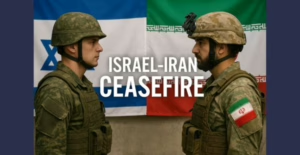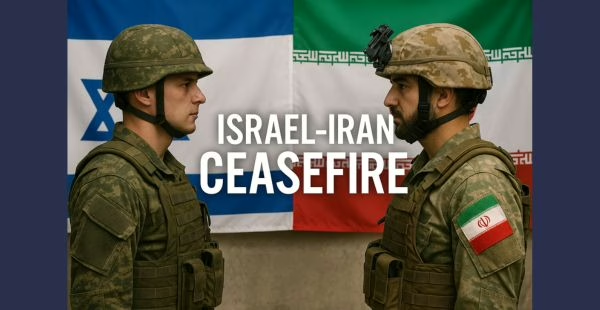
The Middle East has always been a region of complex geopolitics, and in 2025, the Israel Iran war emerged as one of the most significant escalations in recent history. What began as covert operations and mutual threats soon transformed into direct confrontations, leading the world to watch with anxiety as two of the region’s most powerful players clashed.
As tensions soared, diplomatic channels worked overtime, and today, the Israel Iran ceasefire latest developments offer a glimmer of hope for both nations and the broader global community. In this blog, we’ll walk you through the background of the conflict, the Israel Iran war updates, the current ceasefire status, and the path forward.
The Origins of the Israel-Iran War
The Israel Iran war didn’t erupt overnight. For years, the two countries have accused each other of covert attacks, cyber warfare, and proxy conflicts. Israel has long been concerned about Iran’s nuclear ambitions, while Iran has viewed Israel’s regional alliances and military actions as direct threats to its sovereignty.
The 2025 confrontation escalated after a series of Israeli airstrikes targeted what they described as Iranian military facilities suspected of advancing nuclear weapon capabilities. Iran, in turn, retaliated with missile strikes on Israeli cities, sparking fears of an all-out regional war. Both countries suffered military and civilian casualties, and the international community scrambled to intervene.
Israel-Iran War Updates: The Global Stage Reacts
As the fighting intensified, Israel Iran war updates became headline news across the globe. Daily missile strikes, drone attacks, and reports of underground explosions dominated international media.
Israel launched precision airstrikes targeting missile depots and nuclear infrastructure deep inside Iranian territory. Iran’s response was swift and fierce, as missiles rained down on key Israeli cities like Tel Aviv and Be’er Sheva. Civilians in both nations faced nights in bomb shelters, hospitals were overwhelmed, and the ripple effects were felt in oil markets, international diplomacy, and regional security.
Meanwhile, the United States, European Union, Russia, and the Gulf countries called for restraint. Qatar played a critical role as a mediator, facilitating backchannel communications between the two rivals. Despite the constant Israel Iran war updates painting a picture of continued hostilities, there were also growing signs of diplomatic engagement behind the scenes.
Israel-Iran Ceasefire News: A Ray of Hope
After nearly two weeks of escalating violence, the world finally received significant Israel Iran ceasefire news. Former U.S. President Donald Trump, who had remained a vocal figure in international affairs, unexpectedly announced that a phased ceasefire had been negotiated.
According to Trump’s announcement, the ceasefire would begin in stages, with Iran halting missile strikes first, followed by Israel. This news was later confirmed by various diplomatic sources, though Iran initially denied any formal agreement, insisting that they would only fully stop retaliations if Israeli attacks ceased completely.
As the Israel Iran ceasefire news spread, global leaders cautiously welcomed the development, though many experts warned that the situation remained fragile. Sporadic missile launches were still reported even after the ceasefire’s announced start time, indicating that ground-level implementation was far from perfect.
The Israel-Iran Ceasefire Agreement: Terms and Challenges
The Israel Iran ceasefire agreement is not a simple document but rather a complex, evolving understanding brokered with significant international pressure. According to sources familiar with the negotiations, the key points of the Israel Iran ceasefire agreement included:
-
Immediate cessation of direct missile strikes by both countries.
-
Gradual withdrawal of military assets from contested zones.
-
Reopening of diplomatic communication channels to manage future escalations.
-
An international monitoring mechanism involving Qatar and neutral observers.
However, the Israel Iran ceasefire agreement has not been universally accepted by all factions within either nation. Hardliners in both Iran and Israel remain skeptical of the ceasefire, arguing that their countries should continue to assert dominance until strategic objectives are fully achieved.
One of the major hurdles is the absence of trust. Years of proxy wars, cyber-attacks, and mutual sabotage have left deep scars. While political leaders may sign ceasefire agreements, enforcing them on the ground amid fragmented military commands is a massive challenge.
Israel-Iran Ceasefire Latest: Where Are We Now?
As of today, the Israel Iran ceasefire latest reports suggest a mixed picture. On one hand, the frequency of missile launches has significantly decreased, and major Israeli airstrikes have reportedly paused. On the other hand, occasional violations continue to surface, particularly in border areas and at sea.
Iranian officials maintain that their missile systems remain on high alert, ready to respond if provoked. Israeli defense sources have indicated that their air force is still monitoring Iranian activities closely, and readiness levels remain at their peak.
The Israel Iran ceasefire latest updates also point to increased diplomatic traffic in the region. Qatar has intensified its role as a neutral broker, and reports suggest that backchannel talks are continuing with the involvement of the European Union and Russia. The goal is to solidify a more permanent de-escalation mechanism that can prevent future flare-ups.
Looking Ahead: Will the Ceasefire Hold?
The road ahead is uncertain. While the Israel Iran ceasefire agreement is a step in the right direction, the underlying issues—nuclear ambitions, regional influence, and security guarantees—remain unresolved.
For a sustainable peace, both sides will need to engage in transparent negotiations, allow independent verification of ceasefire terms, and perhaps most importantly, build trust where virtually none exists. This is a tall order given the deep-rooted hostility between Israel and Iran, but international pressure and the sheer cost of war may push both parties toward a longer-lasting solution.
The Israel Iran ceasefire latest developments are being watched closely not just by regional players but by the entire world. The risk of a renewed conflict could destabilize global energy markets, trigger humanitarian crises, and draw in powerful nations into another Middle Eastern war.
Conclusion
The Israel Iran war marks one of the most dangerous confrontations in recent history, but the progress toward a ceasefire offers a much-needed pause. From the ongoing Israel Iran war updates to the complex Israel Iran ceasefire agreement, each step reflects how delicate the balance of power in the Middle East has become.
For now, the Israel Iran ceasefire news brings hope to millions, even as both sides remain cautious. Continued diplomatic engagement, sustained international oversight, and a genuine commitment to peace will determine whether this fragile truce can evolve into something more enduring.
As we track the Israel Iran ceasefire latest in the coming days and weeks, the world holds its breath, hoping that this ceasefire marks the beginning of a new chapter—one defined not by war, but by dialogue.

